Posted on Thursday, October 14th, 2021
Algonquin College’s Pembroke Waterfront Campus continues to expand its programming, offering more choices for anyone interested in pursuing a college certificate, diploma or degree. The campus will be hosting a virtual Open House on Wednesday, October 20 from 3:30 to 7:30 p.m. that will include an opportunity for prospective students to learn more about the programs.
The sessions will be led by faculty who teach in the 23 programs that will be represented. The program mix at the campus includes business, technology, health care, skilled trades and unique programs such as Applied Nuclear Science and Radiation Safety, Outdoor Adventure and Environmental Technician.

The campus is also launching two new programs starting in January of 2022. Geographical Information Systems is a post-graduate certificate program and Computer Programming is a two-year diploma program that includes an optional paid co-op experience. These programs join the Environmental Management and Assessment post-graduate certificate program that was offered for the first time at the campus last year.
In addition to the program sessions, there will also be a special session for parents and several student services sessions that will help address questions about admissions requirements, financial aid and what supports are available to help students succeed in their academic programs. When the time comes to visit the campus, students will really be able to appreciate the picturesque beauty of the campus which is located on the shores of the Ottawa River.

Virtual sessions have proven to be very convenient for prospective students and their families, particularly applicants who don’t live in Pembroke. It eliminates the need to travel and provides great access to faculty and student services staff to get questions answered. A virtual campus tour is also available and there will be some prizes available for those who attend.
The COVID-19 pandemic has forced many organizations to expand their use of technology and the same is true for Algonquin College. While more programming is gradually returning to the Waterfront Campus, remote learning is continuing and the College is utilizing platforms such as ZOOM to be able to bring information to prospective students in the most convenient way possible.

Pre-registration is required for the virtual Open House so that links can be provided to students who want to attend. The event is open to anyone who is interested in attending Algonquin College as representatives for the Ottawa and Perth campuses will also be available to answer questions. Information on the Open House has been shared with high schools and employment services offices throughout the region as Ontario Colleges are now receiving applications for both the Winter and Fall 2022 intakes.
In fact, offers of admission for the Fall 2022 intake will start to be made as of November 1st so it’s not too early to apply and make plans for attending a college program. Applications can be made online at www.ontariocolleges.ca. Prospective students can pre-register for the Open House at: https://www.algonquincollege.com/pembroke/voh/
Posted by Jamie Bramburger, Manager of Community and Student Affairs at Algonquin College’s Pembroke Waterfront Campus. Jamie can be reached at brambuj@algonquincollege.com or at 613-735-4700, ext. 2756
Posted on Thursday, September 16th, 2021
Jason Blaine hadn’t performed with his band since July of 2019. That changed this week when Blaine returned to his hometown of Pembroke to host his annual charity concert and golf tournament. Instead of a two-day event, it was scaled back to a one-day, nine hole event that included a nighttime outdoor concert at the Pembroke Golf Club. It had to be that way because of the restrictions that are necessary during the COVID-19 pandemic.

There are few industries that know more about the impact of the pandemic than entertainment, but as the world slowly re-opens and fairs, festivals and concerts are again permitted, Blaine can see a light at the end of the tunnel. After cancelling his charity event last year, he was thrilled to be back home and doing what he loves-performing on a stage.
“It’s been an emotional rollercoaster. It’s not just the music and the fans that you miss, it’s the camaraderie of making music together. It’s feels so great to be home,” says Blaine.

Blaine established his charitable fund 8 years ago. It evolved into a signature event in the Ottawa Valley attracting other Canadian Country recording artists from across the country including Dallas Smith, Kira Isabella, Chad Brownlee, Tebey, Gord Bamford and Aaron Pritchett. With plenty of star power and a lot of community support the charity has raised more than a half-a-million dollars for local organizations including Algonquin College’s Pembroke Waterfront Campus.
Despite the modified format this year, the return of the event was a huge success, raising $87,000 all of which will be invested in community organizations and special projects in the Pembroke area.
“This event has become really special to me. It provides me with a purpose, adds an extra value to the music and what I do. I try to make as big an impact as I can with the music, especially seeing the impact it has had on the community,” says Blaine who from day one wanted to support youth and mental health causes.
He has delivered on that promise, committing $100,000 to the building fund for the Waterfront Campus and an additional $100,000 to establish an endowment to support college students in financial need. As a Business graduate of the Pembroke Campus, Blaine continues to give back to his alma mater, placing a high priority on supporting access to post-secondary education in his charitable giving.
“It is so great to see the endowment fund growing and students benefitting from it. Having Algonquin College in the heart of Pembroke has brought an energy and a revitalization to the community,” says Blaine who has also been generous with the Pembroke and Area Boys and Girls Club and the Robbie Dean Family Counselling Centre.

He and his wife, Amy, also an Algonquin College graduate, live just outside Nashville, Tennessee where they are raising four children. Blaine moved to the United States to kick start his music career after graduating from Algonquin College where he started to write his own songs. Since then he has recorded several top hits including: They Don’t Make ‘Em Like That Anymore, Cool, Spotlight and Rock in My Boot.

One thing that is clear is that Blaine has never forgotten his roots. It’s where he first picked up a musical instrument as a little boy and set forth a plan to become a musician. He’s fulfilled that dream and at least for one day he was happy to be back on stage in his hometown.
(Posted by Jamie Bramburger, Manager of Community and Student Affairs at the Pembroke Waterfront Campus)
Posted on Saturday, September 11th, 2021
Monica Numpaque is getting used to the quiet tranquility of Pembroke, leaving behind the hustle and bustle of a large urban city and the noise and pollution that comes with it, replaced by the sound of birds chirping, the occasional honk of a car horn, clean air and the picturesque beauty of Pembroke’s waterfront.
Numpaque arrived in Canada from Bogota, Colombia, a city of 7.5 million people in April, coming to Pembroke to study in the Environmental Management and Assessment program at Algonquin College’s Waterfront Campus. She was excited to move to Canada for her post-secondary studies, but her expectations have been exceeded.
“I have found that living in a small city like Pembroke has various benefits, including a calm and safe environment. Pembroke is organized and clean, and people have a calm living style, so they are not in a hurry. I appreciate how people are friendly and courteous and welcome you when they see you, wishing you a nice day,” says Numpaque.

Numpaque and her husband are hoping to immigrate to Canada after she completes her co-op placement at the College where she is a science lab monitor, supporting students studying in the Environmental Technician program. She feels fortunate to be working at the College and says the opportunity to participate in a paid co-op placement attracted her to the program.
“I chose the program at Algonquin College since this college is internationally recognized for offering high-quality academic programs. I chose the Pembroke campus because I wanted to study in a peaceful environment surrounded by nature. Furthermore, the curriculum includes courses in a variety of subjects connected to environmental sciences that are both interesting and useful. The field experiences, as well as the Co-op, attracted me to the program,” says Numpaque.
With no vehicle, Numpaque has been getting to know Pembroke on her bike and by walking around the city. Like many newcomers, she is impressed by the vastness of Canada and the wide open spaces that are found in more rural areas. “Canadians are very friendly and kind, they have helped me to adapt to this country and to learn about their interesting culture. Pembroke is a lovely town surrounded by nature, with great spots to ride a bike and participate in water sports. The architecture of its historic homes, churches, and museums make Pembroke a nice place to live.”

During the peak of the COVID-19 pandemic last winter, international students studying in the Environmental Management and Assessment program were able to join the program from their home country, taking the entire first semester of the post-graduate certificate program in a virtual setting. They were required to come to Canada for the spring term to ensure they had the opportunity to participate in many hours of field work.
Learning in Canada’s back country has provided Numpaque with not only a practical learning experience, but also an opportunity to appreciate the country’s natural landscape. “I have enjoyed the field trips offered in the program. We have visited wonderful places full of nature with beautiful landscapes. I have enjoyed as well the sample processing lab where I have learned valuable analytical techniques. The campus location fascinates me since it provides a beautiful view of the Ottawa river and is close to the Waterfront Park, where you can relax and enjoy nature,” says Numpaque.
Recently her husband has found work in Ottawa. The couple is planning to buy a vehicle and begin the process of gaining permanent residency status. Their journey is just starting in Canada. For the next few months, Numpaque will spend many hours in the science lab at the Pembroke Campus gaining valuable work experience in her field, working side-by-side faculty and supporting other students enrolled in environmental science programs.

Numpaque has barely spent any time in the country that she hopes to live and work in for many years, but Pembroke has left her with a great first impression of Canada. Her story is an example of how smaller communities that are welcoming to international students and immigrants can be a landing place for newcomers if they are welcoming and have attractions such as post-secondary schools to grab their attention.
It was Algonquin College that brought Numpaque to Pembroke. It will be the community that will help settle her in the city.
(Posted by Jamie Bramburger, Manager of Community and Student Affairs. Algonquin College’s Pembroke Campus administers the federally funded Local Immigration Partnership in Lanark and Renfrew Counties, a program that helps communities welcome newcomers to their region.)
Posted on Friday, September 3rd, 2021
At Parliament Hill, the small shoes and teddy bears that surround the Centennial Flame are weather-beaten. They have been there since the discovery of 215 unmarked graves in Kamloops, British Columbia earlier this summer. Since then, the remains of hundreds more children have been found at former residential schools.
Each day these tiny bits of children’s clothing are viewed by thousands of visitors to Canada’s capital, a stark reminder of Canada’s tragic residential school history. As the country prepares for its first National Day of Truth and Reconciliation on September 30, Canadians are trying to come to grips with this history, a truth that was known but somehow stayed out of the Canadian conscience for decades.
“We knew,” says Ry Moran, founding Director of the National Centre for Truth and Reconciliation and now the first Associate Librarian for Reconciliation at the University of Victoria. Moran was on the front line of reviewing residential school survivor stories during the work of the Truth and Reconciliation Commission led by his Honour, Murray Sinclair.
Through this work, Moran and his team reviewed more than 7,000 statements, recording many of them on video, an emotional experience which he says has changed him forever. “You can not help but be moved, and to see the injustices of this country laid bare. We have to as individual Canadian citizens come to understand what happened in residential schools,” says Moran.
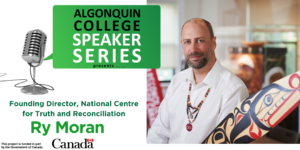
Moran will be speaking on Canada’s Residential School Tragedy at a virtual Algonquin College Pembroke Campus Speaker Series on Tuesday, September 14 at 7 p.m. The hour-long session will include a question-and-answer period, but it will mostly be an opportunity for Moran to share the truth of what happened at residential schools. “Whether it is comfortable or not, it is the truth. A great wrong was done to communities, to families, to those children by ignoring their human rights. That great wrong is what Canadians have to understand,” emphasizes Moran.
The Truth and Reconciliation Commission issued 94 calls to action when it released its final report in 2015. Among them was recommendation number 80 to establish as a statutory holiday, a National Day to honour survivors, their families and communities and to ensure public commemoration of the history and legacy of residential schools.
The commission deemed this national day as being a vital component of the reconciliation process, choosing a day that had already gained traction because of the story it represented. Initiated in 2013 in Williams Lake, British Columbia, Orange Shirt Day on September 30 was established to remember the story of a little girl, Phyllis Webstad, who on her first day attending a residential school had her new orange shirt taken away. The shirt had been given to her by her Grandmother and was never returned. As an adult, Webstad shared this story, describing how deeply hurt she was but that “no one cared and I felt like I was worth nothing.”

Ry Moran, Founding Director of the National Centre for Truth and Reconciliation is interviewed by Algonquin College Manager of Community and Student Affairs on Your TV Ottawa Valley (Cogeco Cable) about Canada’s Residential School past and the impact these schools have had on Indigenous peoples and communities.
In his home office, Moran has an orange shirt and an Indigenous blanket hanging from his wall. The blanket was given to Moran shortly after the National Centre was created at the University of Manitoba where a much larger version of the blanket is on display. The blanket and the shirt remind him of all of the children who were affected by residential schools, whether they experienced them first hand or have been impacted by the legacy impact of the schools on Indigenous families and communities.
“The history has been present, but frankly, Canadians have not been paying attention. We have to care more,” says Moran.
Moran believes Canadians are now paying attention. He cites more access to public education about Indigenous history and a lot of brave people speaking out and sharing their stories as a catalyst for a public discourse that is long overdue. But, he also says it is just the beginning, offering this advice to Canadians.
“Listen and follow Indigenous thought leaders, get informed, get involved, stand up for injustices and make it your business,” says Moran. That’s what Moran is doing. As a member of the Red River Metis and through his work with the Truth and Reconciliation Commission, he has made many connections over the past decade and continues to learn more about his heritage and his country. As he learns, he shares, becoming one of the important voices to ensure the calls to action are implemented.
In Ottawa, the Centennial Flame was first lit in 1967 to commemorate the county’s one-hundredth anniversary. It has been a place where Canadians have had their picture taken in front of the back-drop of the Peace Tower and Centre Block, the centre of our country’s government.
Today, the Flame has become a focal point for people to express their remorse for what happened at residential schools. The children’s clothing, including orange t-shirts, that surround the flame reminds us of Phyllis Webstad, the little girl who was forcibly taken from her home, stripped of her culture, her language and her identity. She survived. Many did not. Knowing this truth brings meaning to the message of orange shirt day – every child matters.
Post by: Jamie Bramburger is the Manager of Community and Student Affairs at Algonquin College’s Pembroke Waterfront Campus. Ry Moran will also be presenting at the College’s Fall Business Leadership conference on Monday, October 25. During his virtual session, Moran will discuss how to bring truth and reconciliation into the workplace.
Posted on Thursday, August 19th, 2021
The scenes of despair that have emerged from Afghanistan have shocked the world. Afghans hanging off of airplanes trying to leave the country as it grapples with the return of the Taliban to power, are reminders of why Canadian soldiers spent more than ten years in the war-torn country trying to give Afghans a better life. Now, as an oppressive regime regains power the war-torn country is again in turmoil and there are fears the progress that had been made has been lost.
From 2002 to 2014, Canada sent 40,000 troops to Afghanistan, a NATO mission that cost 158 Canadian soldiers their lives including Chief Warrant Officer, Robert Girouard, who lost his life two days after his 46th birthday. Based at Garrison Petawawa, Girouard had been in the armed forces for almost 30 years. He was a career soldier, married with three children and well respected by the troops who reported to him and soldiered beside him.

His only daughter, Jocelyn Girouard-Ranger, has been thinking a lot about her father as Afghanistan unravels. “I refuse to believe that he died in vain,” says Girouard-Ranger, who was 21 years old when she lost the man who had raised her as the family moved around the world from one base to another, including a posting in Germany and several stops in Canada. “He loved the military. He joined at 17 years old. He was hard-working, good at his job and got along well with people. He and my Mom were talking about retirement after Afghanistan,” says Girouard-Ranger.
Jocelyn Girouard-Ranger with her Father, Chief Warrant Officer, Robert Girouard, shortly before he was killed in Afghanistan in 2006.
On November 27, 2006, Warrant Officer Girouard was in an armoured vehicle participating in a military convoy in Kandahar, a hot spot where militant Taliban insurgents often clashed with NATO troops. A suicide bomber drove a car into the middle of the convoy setting off a powerful explosion that killed Girouard and another Canadian soldier, Corporal Albert Storm.
When the tragedy happened, Jocelyn Girouard-Ranger had just started in the Social Service Worker program at Algonquin College’s Pembroke Campus. She was planning her wedding, scheduled for eight months later, but her father’s death dealt her a jarring blow. She dropped out of school, had trouble coping and considered cancelling her marriage ceremony. “I just didn’t know how I was going to walk down the aisle without him,” says Girouard-Ranger.
She and her husband, Sergeant Eric Ranger, did go ahead with their wedding and three years later, Girouard-Ranger was ready to return to school. She was also a first time Mom when she made plans to enroll in the Business program at the Pembroke Campus. She was prepared to fund her education on her own.
One day she was reading a newspaper article and learned about Project Hero, an initiative inspired and launched by retired General Rick Hillier and Kevin Reed, a Toronto businessman and Honorary Canadian Forces Lieutenant Colonel during the peak of the Afghanistan war. Project Hero encouraged Canadian colleges and universities to offer free tuition to the children of soldiers killed in military missions. Algonquin College was one of the first colleges in the country to sign on.
Girouard-Ranger contacted the Pembroke Campus to inquire if she was eligible for the scholarship. Within days the financial strain of paying for her post-secondary tuition was removed. She also received support through another initiative called Canada Company that helped cover additional educational expenses. Looking back, she says Project Hero had a huge impact on her ability to attend school, but also in helping her come to terms with her father’s passing.
“It is a tangible and purposeful reminder that these fallen soldier’s legacy lives on in the civilian world. These programs are a reminder that their sacrifice wasn’t forgotten by the public,” says Girouard-Ranger.
Jocelyn Girouard-Ranger stands in a Memorial park at Garrison Petawawa where her father, Chief Warrant Officer, Robert Girouard is honoured and remembered. 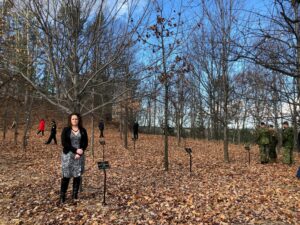
Fifteen years after her father lost his life in Afghanistan, Girouard-Ranger continues to live in Petawawa, where she and her husband are raising three children. She now works for a counselling office, where she works as a client care coordinator and bookkeeper, combining her interest in business and helping others.
Every year she visits her father’s gravesite at the Beechwood cemetery in Ottawa, the final resting place for hundreds of Canadian soldiers. Shortly before his death, her Dad had decided that if something happened to him in Afghanistan, he wanted to be buried among those who had served their country and made the ultimate sacrifice.
Until his final breath, Robert Girouard remained a dedicated soldier who died a hero. He died young, without the opportunity to see his daughter graduate from college and to become a mother. Project Hero was created to honour his sacrifice and to help take care of those he left behind. It is a living memorial to Girouard and his fellow servicemen and women lost while serving their country. They were all heroes.
(Posted by Jamie Bramburger, Manager of Community and Student Affairs at the Pembroke Waterfront Campus)
Posted on Friday, June 18th, 2021
Crystal Martin-Lapenskie knows the hardships faced by Inuit communities. She was raised in Sanirajak in Nunavut, spending her early years in Canada’s Arctic region before moving to the Ottawa Valley as a teenager. For the past two years as the President of the National Inuit Youth Council she has been a powerful voice as an advocate for young people who often struggle to have access to the necessities of life.
From an early age, Martin-Lapenskie wanted to make a difference. After graduating from Opeongo High School, near her Ottawa Valley home in Eganville, she had considered becoming a police officer and applied to the Police Foundations program at Algonquin College’s Pembroke Campus. But, she changed her mind and instead enrolled in the Social Service Worker program, a decision that would propel Martin-Lapenskie into an advocacy role that has taken her around the world, working directly with Indigenous leaders, elected officials and like-minded individuals to shine a light on the most pressing social justice issues facing Inuit youth. She has twice met with Prime Minister Justin Trudeau and has connected with several federal cabinet ministers where she has participated in committees and working groups to address public policy.
Martin-Lapenskie graduated from Algonquin College in 2013. Soon after she began working with Inuit communities, taking on leadership positions in economic development while also supporting not-for-profit organizations and starting her own consulting business. Her roles included being a project manager and Acting Regional Director for the Canadian Northern Economic Development Agency (CanNor) and working with Ontario’s Ministry of Education to develop and revamp curriculum to include Inuit history.

Frequently invited to round tables and consultations with government officials, Martin-Lapenskie is always willing to share her voice as a representative for Canada’s Inuit youth. The 94 calls to action in the Truth and Reconciliation report have become her playbook as she brings attention to the many issues facing young people in Canada’s Northern communities such as access to mental health services, but surprisingly, Martin-Lapenskie believes there has been a silver lining through the COVID-19 pandemic.
“Inuit have the highest suicide rates not only in Canada, but in the entire world. When COVID happened last year, my heart sank with the thought of losing more youth as we lack proper mental health services across Inuit Nunangat, but the pandemic brought our communities together and that closeness has resulted in the lowest suicide numbers we’ve seen. Inuit youth are utilizing this time to immerse themselves out on the land with their loved ones, proving that land based initiatives are paramount to the well-being of our people,” says Martin-Lapenskie.

Crystal Martin-Lapenskie is intelligent, well spoken and passionate about her work, much of it unpaid. Volunteerism is a huge part of her approach to sharing her message about the needs of Inuit youth. She sits on several committees providing valuable input to organizations such as the Renfrew County District School Board, Renfrew County Catholic District School Board, United Way East Ontario, International Inuit Business Association, and the Kamatsianig Council that advises on polices that impact Inuit children and youth in the welfare sector.
“Canadians need to know that Inuit are among the most resourceful, resilient and adaptable people in Canada and although they live through socio-economic disparities, Inuit youth have not lost hope and have been awakened by the reclamation of our cultural traditions and language,” says Martin-Lapenskie, who has taken a particular interest in supporting the health and wellness of Inuit.

She recently welcomed a production crew to her home so she could record a federal public service announcement encouraging Inuit to get their vaccination to help stop the spread of the pandemic. It’s this type of meaningful advocacy that has made Martin-Lapenskie one of Canada’s most important Indigenous voices.
As she wraps up her two-year term as the President of the National Inuit Council, Martin-Lapenskie is proud of the work that she has done, but is not about to slow down in her advocacy efforts. She understands too well the socio-economic issues facing Northern youth and has committed herself to staying connected with a part of Canada that few Canadians know. For Martin-Lapenskie, the North will always be her home, the place that drives her ambition to help others and the reason she became a Social Service Worker.
(Posted by Jamie Bramburger, Manager of Community and Student Affairs)
Posted on Monday, June 14th, 2021
Allan Huckabone had charisma. He could hold court in any room he entered and on November 24, 2009 he had the audience’s attention at a dinner held at the former Algonquin College Pembroke Campus. He and his wife, Kathleen, were among a group of college supporters who were interested in the effort being made to build a new campus, but very few in the crowd knew that they were about to make a jaw dropping announcement.
The campus was just down the street from where Allan Huckabone had grown up. He knew the building’s history as a former dairy and understood it was aging and had its limitations in meeting the expectations of college students. His very close friend, Fred Blackstein, was on the College Board of Governors and a year earlier had brought forward a motion that was unanimously approved to build a Waterfront Campus along the shores of the Ottawa River. Blackstein also threw his support behind the fundraising campaign, letting his name stand as Honorary Chair, helping share the story of how important the project was to the region.

The Huckabones wanted to help. Their son, Mark Huckabone, had been recruited to chair the fundraising effort, a campaign to raise $2.5 million towards the overall project cost of $36-million. The Pembroke Campus had never gone to the community before to raise money and with no history of fundraising a strong case needed to be made to bring donors on board.
The case was solid. The building the school had been operating in since the 1960’s was aging and landlocked with no room for expansion. It lacked the modern amenities that post-secondary schools offered students such as a gymnasium and fitness centre. The College had secured land from the city to build a new campus with the promise of helping to revitalize Pembroke’s downtown and ultimately a modern facility would attract more local and out of town students, helping support the local labour market and driving further economic spinoffs for the entire region.
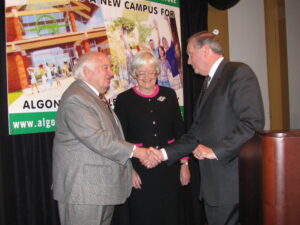
Kathleen and Allan Huckabone believed in the project. When they stood behind a podium at the old campus and announced they had donated a half-a-million dollars to the campaign they gave the fundraising campaign the boost it needed. As Kathleen told the audience, “We hope this donation will spark a flame to go through this room to all of the Valley,” to encourage more support for this worthwhile project.
It sure did. Other donations followed. Businesses, individuals, families and organizations followed the Huckabones lead and committed to helping the College reach its fundraising target. The project had momentum.
When sod was turned in the spring of 2011, the Huckabones were there. When the grand opening was held on November 28, 2012, they were there too, beaming as they posed near the campus library, which had been named after them.
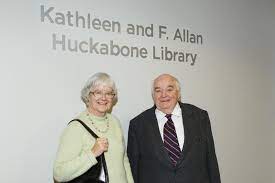
Allan Huckabone passed away a few days ago at Miramichi Lodge where he had lived the final years of his life. Kathleen Huckabone had died in 2015. Together, they left a legacy. Known for their philanthropic generosity, they supported many community projects, but their gift to Algonquin College will forever be remembered because of its significance.
At the time the Huckabones made their donation public, Algonquin College was also raising funds for new buildings in Ottawa and Perth. College President, Robert Gillett, said of the Huckabone contribution, “This is the largest single donation by a family of all of the gifts we have received so far.”
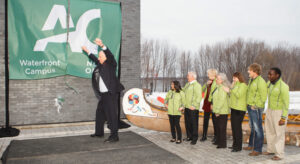
The donor wall at the campus carries a quote from Mark Huckabone that reads, “For every enthusiastic student who attends this College campus, there was an enthusiastic donor who made it possible.” Allan and Kathleen Huckabone drove that enthusiasm by making one of the largest philanthropic gifts in Ottawa Valley history.
The Kathleen and F. Allan Huckabone library is one of the centrepieces of the waterfront campus. The only time the couple visited the library was on the day the community celebrated the grand opening of the campus. That was enough to show them that their gift had made a difference.
The entire college community expresses its sincere sympathy to the Huckabone family at this difficult time and continues to be thankful for the important role Allan and Kathleen Huckabone played in securing a new Algonquin College campus for Pembroke.
(Posted by Jamie Bramburger, Manager of Community and Student Affairs)
Posted on Friday, May 28th, 2021
The days were long, the sun was hot, but the satisfaction of a job well done is what inspired 23 Forestry Technician students from Algonquin College’s Pembroke Campus to plant 30,000 trees in Algonquin Park and the Nipissing Forest.
In a program that involves hundreds of hours of practical learning experiences in forests and bush lots, this was the ultimate challenge for the students because of how meaningful the project was. Trees are one of natures most renewable resources, but these trees are special. They have been planted in memory of people who recently passed away.
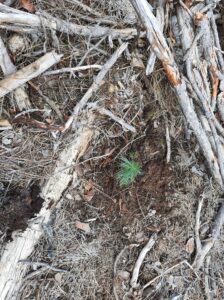
The project was sponsored by the Ontario Woodlot Association, the Canadian Institute of Forestry, Friends of the Petawawa Research Forest, Nipissing Forest Management Inc. and the Algonquin Forestry Authority. The trees included white pine, red pine and white spruce seedlings. As a thank you to the students, a $5,000 donation was made to the College in support of the Forestry Technician program.
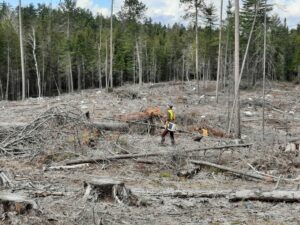
Forestry Technician Program Coordinator, Peter Arbour says, “This was such a satisfying experience for the students. Planting trees in an operational context, creating a living memorial and helping the forest for the next 100 years, while raising funds for the College, was a beautiful thing.”.
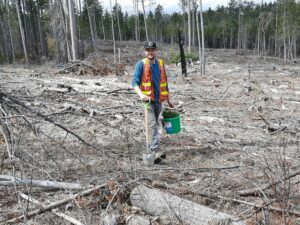
The Forestry Technician program is the longest standing program offered at the Pembroke Campus. It was established shortly after the campus began operations in the late 1960’s and has produced hundreds of graduates who have supported the labour market needs of one of Canada’s most important industries. Technicians trained by Algonquin College can be found in forest operations across the country and throughout the Ottawa Valley which is well known for its forestry roots.
About twenty years ago, the program format was modified from being a traditional two year diploma program to a compressed diploma program. This transition has allowed students to complete the program in one calendar year. It’s also what made this tree planting project possible, because students are available during the spring and summer months as they are finishing up their final semester before graduating in late August.
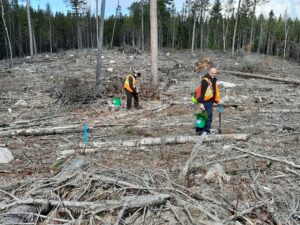
The program continues to be very popular, attracting more applicants than the number of seats available. In recent years, the Pembroke Campus also introduced an Urban Forestry-Arboriculture program and it has also been well received. Both programs have waitlists for the Fall 2021 intake which is good news for an industry that has experienced some labour market shortages in recent years.
Both the Forestry Technician and the Arborist programs attract students from across Ontario and Quebec, and in some cases other parts of Canada. Forestry is an industry that has been around for hundreds of years, and it will continue with Algonquin College well established as one of the leading forestry education post-secondary schools in the country.
Posted by Jamie Bramburger, Manager of Community and Student Affairs)
Posted on Sunday, May 16th, 2021
The COVID-19 pandemic has been disruptive to many things in life including education, but in some parts of the province there have been some excellent partnerships between Colleges and District School Boards that have benefitted high school students. Renfrew County is one of those places where there is a significant blue-collar workforce and looming labour market shortages.
The skilled trades have been particularly hard hit. An aging workforce, a housing construction boom and a stubborn pandemic have created the perfect storm, but these workforce gaps have also created some urgency for Algonquin College’s Pembroke Campus and the Renfrew County Public and Catholic District School Boards to create more opportunities for students interested in skilled trades careers.

While most Ontario high school students are studying from home, a small group of high school seniors are swinging hammers and making precision cuts as they complete level one of the General Carpenter apprenticeship program at the Pembroke Campus. With the support of the Renfrew County District Health Unit, the two school boards and the College, 18 students are enrolled in the program, nine from each board. It’s part of a School-College-Work-Initiative that helps high school students get a taste of college before they graduate from secondary school.
“It’s been quite extraordinary to watch how this partnership has evolved through the pandemic and the sheer determination by all parties to make this work for students,” says Tracy Norris, Acting Manager of Academic Partnerships at Algonquin College.
While Renfrew County has had its share of positive COVID-19 cases, the population base is much smaller and throughout the pandemic there have been fewer regulatory restrictions imposed on the area. The College has continued to deliver a variety of shop classes and labs in a modified format that includes smaller class sizes, work space protective barriers, physical distancing and mask wearing.
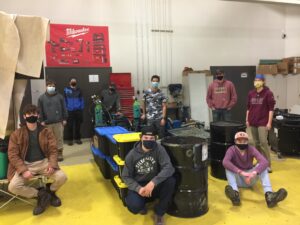 (OYAP Carpenter students with the Renfrew County Catholic District School Board pose for a photo wearing masks and socially distancing from one another. Only nine students are allowed in the shop at one time)
(OYAP Carpenter students with the Renfrew County Catholic District School Board pose for a photo wearing masks and socially distancing from one another. Only nine students are allowed in the shop at one time)
The program began in mid-April and will continue until the end of June. Students have been supplied with books, tools and safety equipment relevant to the trade to support their learning. By splitting the students into two smaller groups, it has ensured the college’s adherence to provincial COVID-19 regulations for delivering trades programs. It has also helped with providing strong program oversight and the coordination of transportation for students to and from school daily.
The program schedule has required students to be flexible. While most classes such as understanding building codes, estimating project costs and using power tools safety are being delivered during the daytime, welding classes are offered in the early evening. The students and their families haven’t questioned the schedule, but they have expressed a lot of gratitude that the program is being offered.
“This has been a great opportunity for the students. There is always a lot of interest in the skilled trades in our area and the students were genuinely excited to be part of the program,” says Tina Noel, OYAP Coordinator for the Renfrew County Catholic District School Board.
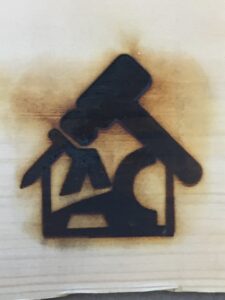
With only a small number of spaces available to students, it was difficult to decide what students would be admitted into the program. It didn’t take long to fill the seats, and those seats were well spaced out. Individual work stations were set up and furniture was adjusted to ensure physical distancing both in the classroom and in the shop.
“The attention to detail to ensure the students could safely and collaboratively hone their carpentry skills, while also experiencing college, has been great,” says Alex Harris, OYAP Coordinator for the Renfrew County District School Board.

During the pandemic, representatives of the school boards and the Pembroke Campus have been meeting weekly. The sole objective of the meetings is to find other pathway program opportunities to keep high school students engaged at a time when many of their other classes are being delivered virtually. The regular communication has produced excellent results.
In addition to the Apprenticeship delivery, more than 100 other high school students in Renfrew County have participated in a dual credit course offered during the 2021-2022 academic semester at the Pembroke Campus. These offerings included courses in Communications, Psychology and Foreign Landscapes. An “introduction to the skilled trades” summer course, planned for this July, will be targeted at groups that are not fully represented in the construction sector, particularly young women and Indigenous youth.
This grassroots effort to introduce more young people to the abundance of career opportunities available in the skilled trades is a great example of how the School-College-Work Initiative is making a difference, one student at a time.
Posted on Friday, April 30th, 2021































